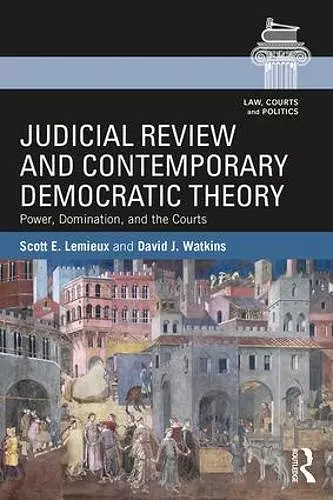Judicial Review and Contemporary Democratic Theory
Power, Domination, and the Courts
Scott E Lemieux author David J Watkins author
Format:Paperback
Publisher:Taylor & Francis Ltd
Published:2nd Nov '17
Currently unavailable, and unfortunately no date known when it will be back
This paperback is available in another edition too:
- Hardback£160.00(9781138095199)

For decades, the question of judicial review’s status in a democratic political system has been adjudicated through the framework of what Alexander Bickel labeled "the counter-majoritarian difficulty." That is, the idea that judicial review is particularly problematic for democracy because it opposes the will of the majority.
Judicial Review and Contemporary Democratic Theory begins with an assessment of the empirical and theoretical flaws of this framework, and an account of the ways in which this framework has hindered meaningful investigation into judicial review’s value within a democratic political system. To replace the counter-majoritarian difficulty framework, Scott E. Lemieux and David J. Watkins draw on recent work in democratic theory emphasizing democracy’s opposition to domination and analyses of constitutional court cases in the United States, Canada, and elsewhere to examine judicial review in its institutional and political context.
Developing democratic criteria for veto points in a democratic system and comparing them to each other against these criteria, Lemieux and Watkins yield fresh insights into judicial review’s democratic value. This book is essential reading for students of law and courts, judicial politics, legal theory and constitutional law.
"A wonderful blend of normative and empirical analysis, which asks important questions about whether the judicial review we experience meets democratic standards, as opposed to the more common concern of whether an idealized form of judicial review might meet democratic standards."—Mark A. Graber, Regents Professor, University of Maryland Carey School of Law
"Creatively blending political theory and institutional analysis, Watkins and Lemieux show why tired arguments over the dangers of judicial activism overlook the courts’ crucial function of protecting democracy from political failures. Their repositioning of courts as unique but fundamentally political institutions challenges both conventional legal and political science understandings of judicial behavior. The book reconfigures American politics by bringing the courts into the picture as necessary partners in ensuring democratic legitimacy and preventing domination."—
Julie Novkov, Professor of Political Science and Women’s, Gender, and Sexuality Studies, University at Albany"This pioneering book challenges conventional thinking about judicial review and moves the field in an exciting new direction. It dismantles minimalist and ‘instructions for judges’ approaches rooted in the wrong-headed countermajoritarian paradigm and redirects our attention to how well courts, as compared to other veto points, contribute to the anti-domination aim of democracy. The authors’ approach---simultaneously theoretical, practical, and comparative---yields properly modest conclusions about the virtues and vices of judicial review."—
Terri Peretti, Professor of Political Science, Santa Clara University"A wonderful blend of normative and empirical analysis, which asks important questions about whether the judicial review we experience meets democratic standards, as opposed to the more common concern of whether an idealized form of judicial review might meet democratic standards."—Mark A. Graber, Regents Professor, University of Maryland Carey School of Law
"Creatively blending political theory and institutional analysis, Watkins and Lemieux show why tired arguments over the dangers of judicial activism overlook the courts’ crucial function of protecting democracy from political failures. Their repositioning of courts as unique but fundamentally political institutions challenges both conventional legal and political science understandings of judicial behavior. The book reconfigures American politics by bringing the courts into the picture as necessary partners in ensuring democratic legitimacy and preventing domination."—
Julie Novkov, Professor of Political Science and Women’s, Gender, and Sexuality Studies, University at Albany"This pioneering book challenges conventional thinking about judicial review and moves the field in an exciting new direction. It dismantles minimalist and ‘instructions for judges’ approaches rooted in the wrong-headed countermajoritarian paradigm and redirects our attention to how well courts, as compared to other veto points, contribute to the anti-domination aim of democracy. The authors’ approach---simultaneously theoretical, practical, and comparative---yields properly modest conclusions about the virtues and vices of judicial review."—
Terri Peretti, Professor of Political Science, Santa Clara UniversityISBN: 9781138095212
Dimensions: unknown
Weight: 294g
184 pages